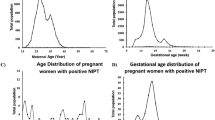Abstract
Cell-free DNA (cfDNA) testing has increased sensitivity and specificity compared to other prenatal screening methods, but invasive diagnostic testing (IDT) is recommended for confirmation. We performed a retrospective chart review of 39 women with abnormal cfDNA results between March 2012 and September 2015 at an urban academic hospital to evaluate patient choice and pregnancy outcomes. We analyzed data using descriptive statistics, Fisher’s exact tests, and Wilcoxon rank-sum tests. Median maternal age was 36.0 years [interquartile range (IQR) 31, 39]; 64.1% of women (25/39) were advanced maternal age and 69.2% (27/39) had abnormal ultrasounds. Median gestational age at time of cfDNA testing was 18 3/7 weeks [IQR 12 2/7, 20 5/7]. cfDNA results included trisomy 21 (89.7%, 35/39), trisomy 18 (7.7%, 3/39), and both trisomy 21/monosomy X (2.6%, 1/39). Of 39 women, 22 (56.4%) continued and 10 (25.6%) terminated the pregnancy; six (15.4%) had fetal demises, and one was lost to follow-up. Of women continuing their pregnancies, 54.6% (12/22) declined further genetic counseling, and 77.3% (17/22) declined IDT. Only 14 women pursued IDT; not pursuing IDT was associated with continuing the pregnancy (Fisher’s exact test, p = .001). All women terminating their pregnancy (90.0%, 9/10) pursued IDT or had major anomalies on ultrasound, suggesting that women considering termination undergo more confirmatory tests or already have high suspicion for an abnormal pregnancy.

Similar content being viewed by others
References
American College of Obstetricians and Gynecologists. (2016). Practice bulletin no. 162: prenatal diagnostic testing for genetic disorders. Obstetrics & Gynecology, 127(5), e108–e122.
American College of Obstetricians and Gynecologists Committee on Genetics. (2015). Committee opinion no. 640: noninvasive prenatal testing for fetal aneuploidy. Obstetrics & Gynecology, 126(3), e31–e37.
Ashoor, G., Syngelaki, A., Wagner, M., Birdir, C., & Nicolaides, K. (2012). Chromosome-selective sequencing of maternal plasma cell-free DNA for first-trimester detection of trisomy 21 and trisomy 18. American Journal of Obstetrics and Gynecology, 206(4), 322.e321–322.e325.
Balkan, M., Kalkanli, S., Akbas, H., Yalinkaya, A., Alp, M. N., & Budak, T. (2010). Parental decisions regarding a prenatally detected fetal chromosomal abnormality and the impact of genetic counseling: an analysis of 38 cases with aneuploidy in Southeast Turkey. Journal of Genetic Counseling, 19, 241–246.
Bianchi, D. W., Platt, L., Goldberg, J., Abuhamad, A., Sehnert, A., & Rava, R. (2012). Genome-wide fetal aneuploidy detection by maternal plasma DNA sequencing. Obstetrics and Gynecology, 119(5), 890–901.
Chelty, S., Garabedian, M., & Norton, M. (2013). Uptake of noninvasive prenatal testing (NIPT) in women following positive aneuploidy screening. Prenatal Diagnosis, 33(6), 542–546.
Farrell, R. M., Nutter, B., & Agatisa, P. K. (2011). Meeting patients’ education and decision-making needs for first trimester prenatal aneuploidy screening. Prenatal Diagnosis, 31, 1222–1228.
Hawkins, A., Stenzel, A., Taylor, J., Chock, V., & Hudgins, L. (2013). Variables influencing pregnancy termination following prenatal diagnosis of fetal chromosome abnormalities. Journal of Genetic Counseling, 22(2), 238–248.
Hurford, E., Hawkins, A., Hudgins, L., & Taylor, J. (2013). The decision to continue a pregnancy affected by down syndrome: timing of decision and satisfaction with receiving a prenatal diagnosis. Journal of Genetic Counseling, 22, 587–593.
Palomaki, G., Kloza, E., Lambert-Messerlian, G., Haddow, J., Neveux, L., Ehrich, M., et al. (2011). DNA sequencing of maternal plasma to detect Down syndrome: an international clinical validation study. Genetics in Medicine, 13(11), 913–920.
Sekizawa, A., Purwosunu, Y., Matsuoka, R., Koide, K., Okazaki, S., Farina, A., et al. (2007). Recent advances in non-invasive prenatal DNA diagnosis through analysis of maternal blood. The Journal of Obstetrics and Gynaecology Research, 33(6), 747–764.
Tiller, G. E., Kershberg, H. B., Goff, J., Coffeen, C., Liao, W., & Sehnert, A. J. (2015). Women’s views and the impact of noninvasive prenatal testing on procedures in a managed care setting. Prenatal Diagnosis, 35(5), 428–433.
Zlotogora, J. (2002). Parental decisions to abort or continue a pregnancy with an abnormal finding after an invasive prenatal test. Prenatal Diagnosis, 22, 1102–1106.
Acknowledgements
This research was conducted as part of the MD program at the University of Pittsburgh School of Medicine.
Author information
Authors and Affiliations
Corresponding author
Ethics declarations
Conflict of Interest
Jessica Lu, Devereux N. Saller, Luanne M. Fraer, and Beatrice A. Chen declare that they have no conflict of interest.
Human Studies and Informed Consent
All procedures performed in studies involving human participants were in accordance with the ethical standards of the institutional and/or national research committee and with the 1964 Helsinki declaration and its later amendments or comparable ethical standards. For this type of study, formal consent is not required.
Rights and permissions
About this article
Cite this article
Lu, J., Saller, D.N., Fraer, L.M. et al. Investigating Pregnancy Outcomes After Abnormal Cell-Free DNA Test Results. J Genet Counsel 27, 902–908 (2018). https://doi.org/10.1007/s10897-018-0219-7
Received:
Accepted:
Published:
Issue Date:
DOI: https://doi.org/10.1007/s10897-018-0219-7




